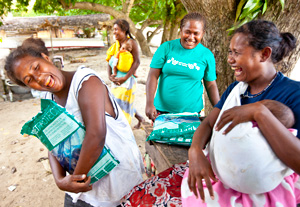The achievements of Vanuatu and Solomon Islands in combatting malaria are on display at the high-level malaria conference Malaria 2012: Saving Lives in the Asia-Pacific, from 31 October to 2 November in Sydney. The World Health Organization has reported that infection rates dropped by at least two-thirds in both countries over the past 10 years.
Improving health services is a priority in Australia's Partnerships for Development with both Solomon Islands and Vanuatu, where Australia has invested $30 million since 2007 to support intensive malaria control and elimination campaigns.
With support from partners like Australia, the World Health Organization and the Global Fund to Fight AIDS, Tuberculosis and Malaria, Solomon Islander and Ni-Vanuatu families are now sleeping under insecticide-treated bed nets and have access to better diagnostic tools, treatment, and indoor residual spraying for mosquitos.
Importantly, AusAID and the World Health Organization are working with the governments of Vanuatu and Solomon Islands to achieve long term improvement across their health systems, so that maternal and child health will improve and communities can access basic health services.
AusAID's James Gilling, the Australian Ambassador for HIV/AIDS, Tuberculosis and Malaria, said both nations should be proud of their achievements in reducing malaria infections.
'Fewer people are suffering from malaria in Solomon Islands and Vanuatu because committed governments and partners are striving together to prevent the spread of this disease.
'Australia is ensuring that our partners have access to world class expertise to assist them in their fight to control and progressively eliminate malaria, while also helping improve health across the board so basic health services such as immunisation and midwifery can be available to all.'
The Solomon Islands provinces of Isabel and Temotu are approaching malaria-free status, and the World Health Organization reports that the malaria incidence rate across the country has dropped to less than 50 cases per 1000 people in 2011–down from nearly 200 cases less than ten years ago.
Vanuatu has achieved similar outstanding results, with malaria cases dropping in the past decade from 74 cases per 1,000 people, to less than 26 cases per 1,000 people in 2011. The Government of Vanuatu is on track to achieve malaria-free status by 2014 in Tafea province, where prevalence is reported to be as low as 0.05 per cent (national prevalence is less than 4 per cent of the total population).
Daniel Leavitt, a Canadian doctor with the Victoria–Vanuatu Physician Project, was delighted by the drop in cases when he returned to Vanuatu in April after a three-year absence.
'[In 2008] we were routinely having to deal with deaths, in the children's ward particularly,' Dr Leavitt, known to his Vanuatu patients as Dokta Dan, said in an email to AusAID staff.
'I was so excited and amazed to return to Tanna Island and not be faced each day with patients sick with malaria. To my surprise I find instead that the goal has been reached and malaria is pretty much eradicated [from Tanna]. It is not just at the hospital, either; I have been to each dispensary and looked at the nurses statistics, and the most any nurse reported to me was two cases in the last year.
'We are so appreciative of the efforts of AusAID and other groups like the Rotarians of Australia that allow us to keep working on Tanna.'

